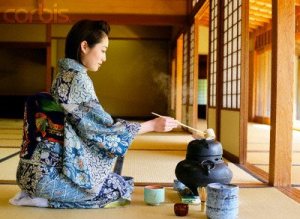In my job as a freelance journalist, I recently interviewed a composer who had spent some time in Japan. He told me what struck him most was the Japanese reverence for mundane and ordinary things. For instance, when he would order bread in a bakery the salesperson would go out of his way to gift-wrap the bread as if it were a birthday present. He was confused and deemed the meticulousness a sheer waste of time, until he witnessed a tea ceremony and realized it was a way of life. He discovered that the secret to the Japanese soul, and consequently the secret to their happiness, is their ability to see sacredness in the little things.
The little things. In the West we tend to take them for granted. They are of minor importance, sometimes even downright intimidating. “The devil is in the details,” we say. It is the big things that matter. We long for an empire, a masterpiece, a legacy. Living large is the yardstick of success. Big things also predominate our religious beliefs. We feel that Truth and God live in high, unattainable heavens, far beyond the scope of our day-to-day lives. But the Japanese have discovered God in the small things.
 The poet Gerard Manley Hopkins wrote, “The world is charged with the grandeur of God…there lives the dearest freshness deep down things.” Hopkins realized that the key to happiness lies in the little things, the “dearest freshness” underpinning all life in the Universe. Seeing that divine freshness is an art that stems from a clear consciousness. This art is sometimes called “mindfulness.” When we are mindful, we live fully in the present moment, the eternal Now. We move out of the clouded firmament of our mind with its restless thoughts and enter into the lush garden of our heart. It is when we are in the heart that we see and feel the inherent beauty of life. There we discover the “dearest freshness” in countless little things: the song of a bird, the colour of a leaf, the smile of a child. Little things are the winks of an ever-benign Universe.
The poet Gerard Manley Hopkins wrote, “The world is charged with the grandeur of God…there lives the dearest freshness deep down things.” Hopkins realized that the key to happiness lies in the little things, the “dearest freshness” underpinning all life in the Universe. Seeing that divine freshness is an art that stems from a clear consciousness. This art is sometimes called “mindfulness.” When we are mindful, we live fully in the present moment, the eternal Now. We move out of the clouded firmament of our mind with its restless thoughts and enter into the lush garden of our heart. It is when we are in the heart that we see and feel the inherent beauty of life. There we discover the “dearest freshness” in countless little things: the song of a bird, the colour of a leaf, the smile of a child. Little things are the winks of an ever-benign Universe.
In order to live in the heart, meditation is helpful. Meditation teaches us how to silence our thoughts. When the mind is calm and tranquil, the heart automatically comes to the fore and opens itself like a flower. It takes time and a little discipline to learn how to meditate, but the benefits are beyond measure.
For when we live in the heart, life is always full of joy. You feel the happiness of a seven-year-old, where every day is full of surprises, newness and joy. A child’s world is composed of hundreds of little things, and he sees meaning in all of them. Perhaps that is why the child is so happy.
My spiritual teacher Sri Chinmoy was the happiest person I have ever known. He was also the most meticulous person I’ve ever known when it came to the small things. Although he had thousands of students, he always made you feel through some small act of kindness that he saw you and loved you.
 My outer relationship to my teacher was mainly confined to running, since I was one of the faster runners in our meditation centre and Sri Chinmoy took interest. Once during a Christmas retreat in Bulgaria, he filmed the finishers of the weekly two-mile race in which his students participated. In the evening he showed his video to us on a big screen. I happened to win that race, but Sri Chinmoy only started filming just after I had finished. It meant that everybody was in the video except for me, which made me a little sad. After all, I had won it!
My outer relationship to my teacher was mainly confined to running, since I was one of the faster runners in our meditation centre and Sri Chinmoy took interest. Once during a Christmas retreat in Bulgaria, he filmed the finishers of the weekly two-mile race in which his students participated. In the evening he showed his video to us on a big screen. I happened to win that race, but Sri Chinmoy only started filming just after I had finished. It meant that everybody was in the video except for me, which made me a little sad. After all, I had won it!
But the moment the video ended, Sri Chinmoy called out from his chair, “I am so, so sorry I missed Abhinabha! He was too fast for me.” I immediately felt consoled, but it didn’t end there. Although it was not his habit, Sri Chinmoy also filmed the next race, and this time made sure he captured me. Again he showed his video to us in the evening and started applauding when I came in first. That little act of kindness and concern made me so happy, because it made me feel truly loved.
When I think of little things, I think of these small acts of kindness. Whenever I happened to miss one of our weekly meditation sessions, one of my friends would always leave some prasad (blessed food) in my room from that meditation. It was an unspoken act of kindness that always put a smile on my face. When I was younger I used to write letters to my best friend, who lived on the other side of the country. Every time one of his letters came, I was in the seventh heaven of delight. Nowadays we just send an e-mail, but it’s not the same as the simple magic of a handwritten message.
 It is rightly said that he that will not stoop for a pin will never be worth a pound. So if you are looking for happiness, start with the little things. Go for a walk outside and appreciate nature’s beauty. Write a letter to a friend you haven’t seen for a while. Tidy up your room or house and enjoy that pure feeling of a clean living space. Like the Japanese, honour the details. And while doing so, try be fully present in the moment. When we take the small things seriously, we hone our good qualities and build up our character. Then when the big things wheel around, we’ll be ready to face them with courage and dignity.
It is rightly said that he that will not stoop for a pin will never be worth a pound. So if you are looking for happiness, start with the little things. Go for a walk outside and appreciate nature’s beauty. Write a letter to a friend you haven’t seen for a while. Tidy up your room or house and enjoy that pure feeling of a clean living space. Like the Japanese, honour the details. And while doing so, try be fully present in the moment. When we take the small things seriously, we hone our good qualities and build up our character. Then when the big things wheel around, we’ll be ready to face them with courage and dignity.

